国际学术交流英语第四单元
- 格式:ppt
- 大小:726.00 KB
- 文档页数:15
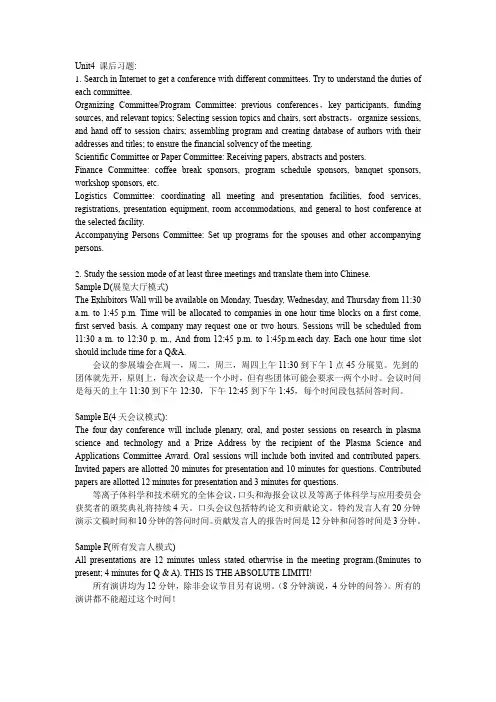
Unit4 课后习题:1.Search in Internet to get a conference with different committees. Try to understand the duties of each committee.Organizing Committee/Program Committee: previous conferences,key participants, funding sources, and relevant topics; Selecting session topics and chairs, sort abstracts,organize sessions, and hand off to session chairs; assembling program and creating database of authors with their addresses and titles; to ensure the financial solvency of the meeting.Scientific Committee or Paper Committee: Receiving papers, abstracts and posters.Finance Committee: coffee break sponsors, program schedule sponsors, banquet sponsors, workshop sponsors, etc.Logistics Committee: coordinating all meeting and presentation facilities, food services, registrations, presentation equipment, room accommodations, and general to host conference at the selected facility.Accompanying Persons Committee: Set up programs for the spouses and other accompanying persons.2.Study the session mode of at least three meetings and translate them into Chinese.Sample D(展览大厅模式)The Exhibitors Wall will be available on Monday, Tuesday, Wednesday, and Thursday from 11:30 a.m. to 1:45 p.m. Time will be allocated to companies in one-hour time blocks on a first-come, first-served basis. A company may request one or two hours. Sessions will be scheduled from 11:30 a m. to 12:30 p. m., And from 12:45 p.m. to 1:45p.m.each day. Each one-hour time slot should include time for a Q&A.会议的参展墙会在周一,周二,周三,周四上午11:30到下午1点45分展览。
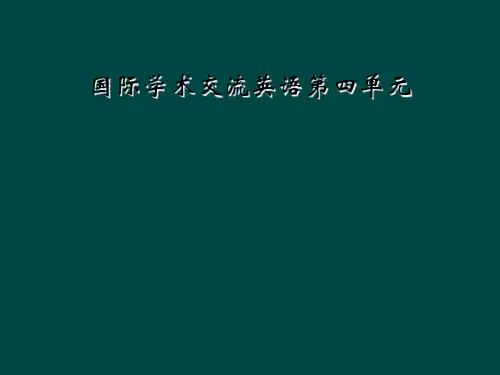
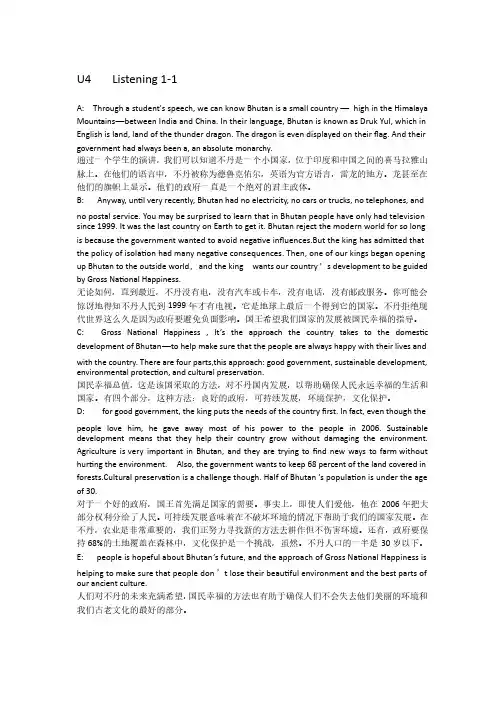
A: Through a student's speech, we can know Bhutan is a small country — high in the Himalaya Mountains —between India and China. In their language, Bhutan is known as Druk Yul, which in English is land, land of the thunder dragon. The dragon is even displayed on their flag. And their government had always been a, an absolute monarchy.通过一个学生的演讲,我们可以知道不丹是一个小国家,位于印度和中国之间的喜马拉雅山脉上。
在他们的语言中,不丹被称为德鲁克佑尔,英语为官方语言,雷龙的地方。
龙甚至在他们的旗帜上显示。
他们的政府一直是一个绝对的君主政体。
他们的旗帜上显示。
他们的政府一直是一个绝对的君主政体。
B:Anyway, un l very recently, Bhutan had no electricity, no cars or trucks, no telephones, and no postal service. You may be surprised to learn that in Bhutan people have only had television since 1999. It was the last country on Earth to get it. Bhutan reject the modern world for so long is because the government wanted to avoid nega ve influences.But the king has admi ed that the policy of isola on had many nega ve consequences. Then, one of our kings began opening up Bhutan to the outside world ,and the king wants our country ’s development to be guided by Gross Na onal Happiness.无论如何,直到最近,不丹没有电,没有汽车或卡车,没有电话,没有邮政服务。
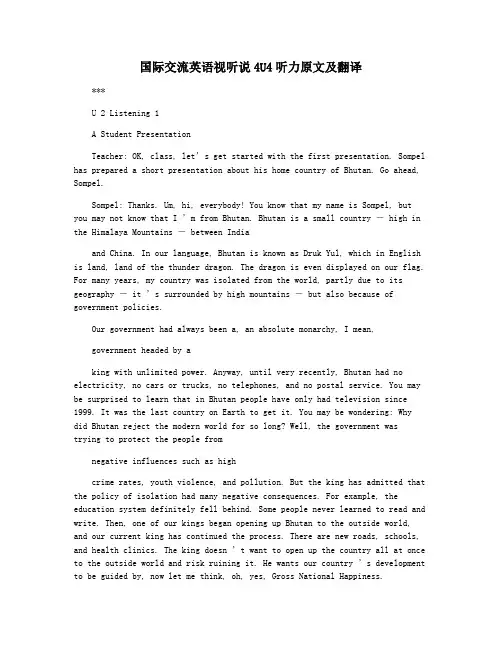
国际交流英语视听说4U4听力原文及翻译***U 2 Listening 1A Student PresentationTeacher: OK, class, let’s get started with the first presentation. Sompel has prepared a short presentation about his home country of Bhutan. Go ahead, Sompel.Sompel: Thanks. Um, hi, everybody! You know that my name is Sompel, but you may not know that I ’m from Bhutan. Bhutan is a small country ― high in the Himalaya Mountains ― between Indiaand China. In our language, Bhutan is known as Druk Yul, which in English is land, land of the thunder dragon. The dragon is even displayed on our flag. For many years, my country was isolated from the world, partly due to its geography ― it ’s surrounded by high mountains ― but also because of government policies.Our government had always been a, an absolute monarchy, I mean,government headed by aking with unlimited power. Anyway, until very recently, Bhutan had no electricity, no cars or trucks, no telephones, and no postal service. You may be surprised to learn that in Bhutan people have only had television since 1999. It was the last country on Earth to get it. You may be wondering: Why did Bhutan reject the modern world for so long? Well, the government wastrying to protect the people fromnegative influences such as highcrime rates, youth violence, and pollution. But the king has admitted that the policy of isolation had many negative consequences. For example, the education system definitely fell behind. Some people never learned to read and write. Then, one of our kings began opening up Bhutan to the outside world, and our current king has continued the process. There are new roads, schools, and health clinics. The king doesn ’t want to open up the country all at once to the outside worl d and risk ruining it. He wants our country ’s development to be guided by, now let me think, oh, yes, Gross National Happiness.Teacher: Sompel, sorry to interrupt, before you continue, could you define Gross National Happiness for the class, please?Sompel: Um, sure. How should I put it? Well, you ’ve probably heard of Gross National Product, which is a phrase that refers to the dollar value ofall the goods and services produced by a countryover a period of time. It’s one way of measuring a country ’s success. But Gross National Happiness is different. Actually, one of our kings invented the phrase Gross National Happiness. It’s the approach the country takes tothe domestic development of Bhutan― to help make surethat the people are always happy with their lives and with the country. There are four parts, um, four “pillars”, to this approach: good government, sustainable development, environmental protection, and cultural preservation. So, for good government, the king puts the needs of the country first. In fact, even though the people love him, he gave away most of his power to the peoplein 2021.That’ s when the country transitioned to democracy. The king still has an important role, but he no longer has absolute power. Real power belongs to the people and the officials that we elect. Sustainable development means that we help our country grow without damaging the environment. And the pillar of environmental protection is closely related to sustainable development, too. Agriculture is veryimportant in Bhutan, and we are trying to find new ways to farm without hurting the******environment.Also, the government wants to keep 68 percent of the land covered in forests. Cultural preservation ― the last pillar― is a challenge though.Half of Bhutan ’s population is in their twenties or younger, and the government anticipates that some young people will get involved with gangs, crime, or drugs, for example. The government has banned television channelsthat they think are harmful. Even so, youth gangs are growing. Theft, whichwas not very common before, is also rising. On the other hand, there is a positive side to all of the changes. In a mountainous country such as Bhutan, communicationtechnologies ― for instance, mobilephones and the Internet ― allow people to communicate more easily than ever before. And it seems that the arts are really moving ahead. Twenty years ago Bhutan had never produced a movie, but these days we produce over 20 a year. And some movies have even displayed the difficulties that Bhutan has had with the challenges of the modern world. These types of movies are important. They can help us explore the contradictions that have come with our changing culture.Teacher: Sompel, ho w do you view Bhutan ’s future?Sompel: Well I ’m hopeful about Bhutan ’s future, and I ’m glad that the approach of Gross National Happiness is helping to make sure that wedon ’t lose our beautiful environment and the best parts of our ancient culture.Sompel: Um, sure. How should I put it? Well, you ’ve probably heard of Gross National Product, which is a phrase that refers to the dollar value of all the goods and services produced by a country over a period of time. It ’s one way of measuring a country ’s success. But Gross National Happiness is different. Actually, one of our kings invented the phrase Gross National Happiness. It’s the approachthe country takes to the domestic development of Bhutan are always happy with their lives and with the country.There are four parts, um, four “pillars”, to this approach: good government, sustainable development, environmental protection, and cultural preservation. So, for good government, the king puts the needs of the country first. In fact, even though the people love him, he gave away most of his power to the people in 2021. That’s when the country transitioned to democracy. The king still has an important role, but he no longer has absolute power. Real power belongs to thepeople and the officials that we elect. Sustainable development means that we help our country grow without damaging theenvironment. And the pillar of environmental protection is closelyrelated to sustainable development, too.Agriculture is very important in Bhutan, and we are trying to find newways to farm without hurting the environment. Also, the government wants to keep 68 percent of the land covered in forests. Cultural preservation ― the last pillar ― is a challenge though. Half of Bhutan’ s population is intheir twenties or younger, and the government anticipates that some young people will get involved with gangs, crime, or drugs, for example. The government has banned television channels that they think are harmful. Even so, youth gangs are growing. Theft, which was not very common before, is also rising.On the other hand, there is a positive side to all of the changes. In a mountainous country such as Bhutan, communication technologies ― for instance, mobile phones and the Internet ― allow― to help make sure that the people******people to communicate more easily than ever before. And it seems that the arts are really moving ahead. Twenty years ago Bhutan had never produced a movie, but these days we produce over 20 a year. And some movies have even displayed the difficulties that Bhutan has had with the challenges of the modern world. These types of movies are important. They can help us explorethe contradictions that have come with our changing culture. 一个学生演讲老师:好,课上,让我们开始第一个演示。
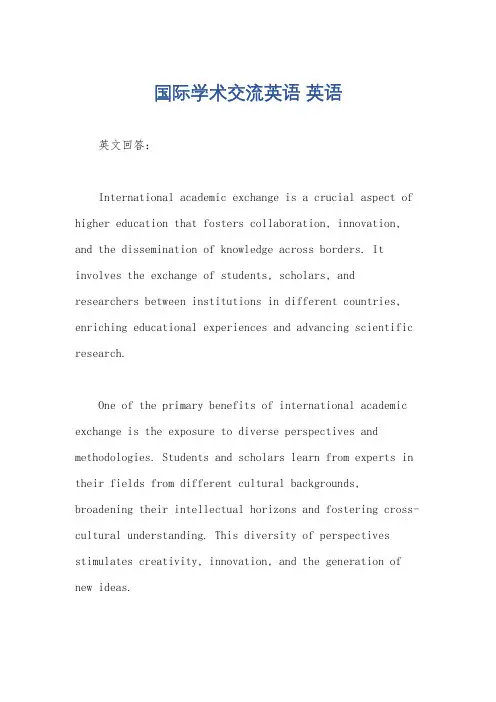
国际学术交流英语英语英文回答:International academic exchange is a crucial aspect of higher education that fosters collaboration, innovation, and the dissemination of knowledge across borders. It involves the exchange of students, scholars, and researchers between institutions in different countries, enriching educational experiences and advancing scientific research.One of the primary benefits of international academic exchange is the exposure to diverse perspectives and methodologies. Students and scholars learn from experts in their fields from different cultural backgrounds, broadening their intellectual horizons and fostering cross-cultural understanding. This diversity of perspectives stimulates creativity, innovation, and the generation of new ideas.International academic exchange also facilitates the transfer of knowledge and skills. Students and researchers gain access to specialized knowledge, cutting-edge research facilities, and advanced technologies through exchange programs. This exposure enhances their academiccapabilities and prepares them for careers in a globalized world.Furthermore, international academic exchange promotes collaboration and networking. Collaborative research projects between institutions in different countries foster interdisciplinary approaches, pooling resources and expertise to address complex global challenges. Networks established through exchange programs facilitate ongoing communication and knowledge sharing, sustaining collaboration beyond the exchange period.Cultural exchange is another significant aspect of international academic exchange. Students and scholars immersed in different cultures develop a deeper understanding of global perspectives, break down stereotypes, and foster empathy for diverse communities.This cultural exchange enriches their personal and professional lives, preparing them to thrive in an increasingly interconnected world.In conclusion, international academic exchange plays a vital role in advancing higher education and research. It promotes intellectual growth, facilitates knowledge transfer, fosters collaboration, and enhances cross-cultural understanding. By embracing international exchange, institutions create opportunities for students, scholars, and researchers to shape a more interconnected and knowledge-driven global community.中文回答:国际学术交流是高等教育中至关重要的一环,它促进了跨境合作、创新和知识传播。
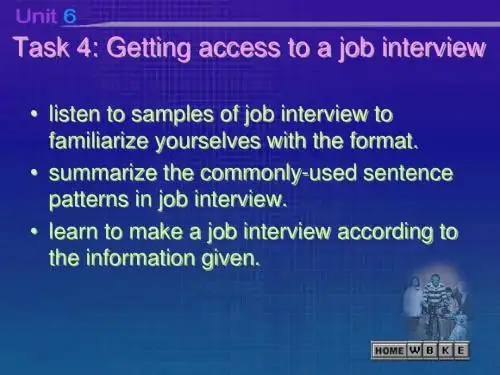
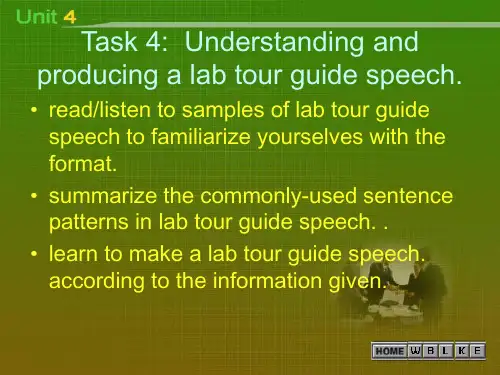
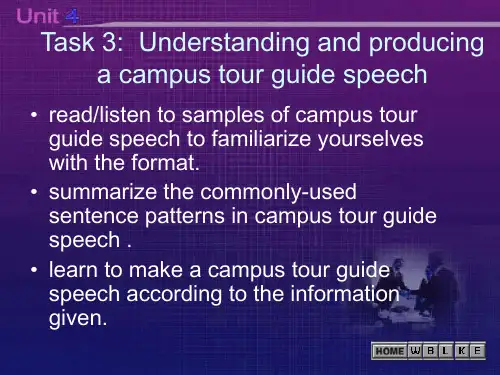

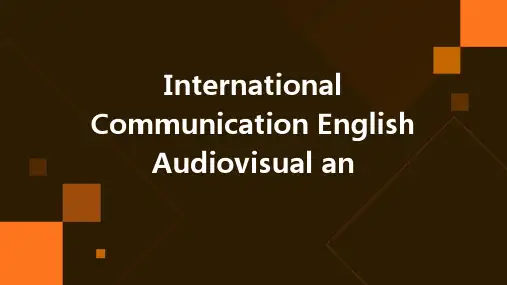
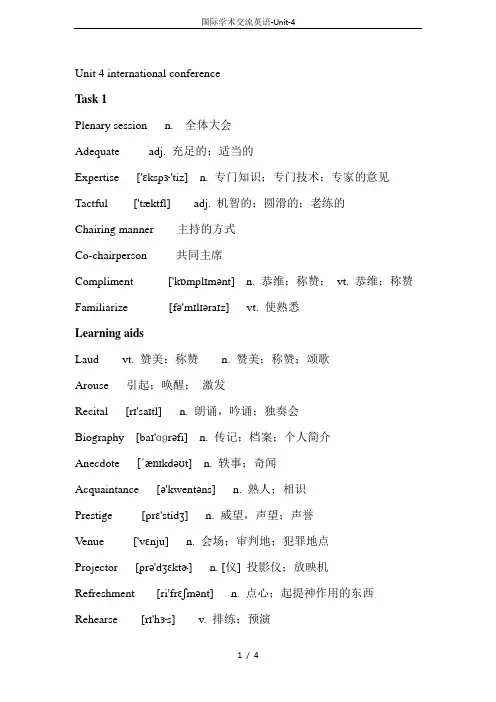
Unit 4 international conferenceTask 1Plenary session n. 全体大会Adequate adj. 充足的;适当的Expertise ['ɛkspɝ'tiz] n. 专门知识;专门技术;专家的意见Tactful ['tæktfl] adj. 机智的;圆滑的;老练的Chairing manner 主持的方式Co-chairperson 共同主席Compliment ['kɒmplɪmənt] n. 恭维;称赞;vt. 恭维;称赞Familiarize [fə'mɪlɪəraɪz] vt. 使熟悉Learning aidsLaud vt. 赞美;称赞n. 赞美;称赞;颂歌Arouse 引起;唤醒;激发Recital [rɪ'saɪtl] n. 朗诵,吟诵;独奏会Biography [baɪ'ɑɡrəfi] n. 传记;档案;个人简介Anecdote [ˈænɪkdəʊt] n. 轶事;奇闻Acquaintance [ə'kwentəns] n. 熟人;相识Prestige [prɛ'stidʒ] n. 威望,声望;声誉Venue ['vɛnju] n. 会场;审判地;犯罪地点Projector [prə'dʒɛktɚ] n. [仪] 投影仪;放映机Refreshment [ri'frɛʃmənt] n. 点心;起提神作用的东西Rehearse [rɪ'hɝs] v. 排练;预演Podium [ˈpəʊdiəm] n. 乐队指挥台;矮墙Erect [ɪ'rɛkt] vt. 使竖立;建造;安装adj. 竖立的;笔直的;Announce [ə'naʊns] vt. 宣布;述说;预示;播报Allotted [ə'lɒtɪd] adj. 专款的;拨出的Decisive [dɪ'saɪsɪv] adj. 决定性的;果断的,坚定的Courteous ['kɝtɪəs] adj. 有礼貌的;谦恭的Impartially [im'pa:ʃəli] adv. 公平地;无私地Adjourn [ə'dʒɝn] vi. 休会;延期;换地方vt. 推迟Privilege ['prɪvlɪdʒ] n. 特权;优待;基本权利Symposium [sɪmˈpəʊziəm] n. 讨论会,座谈会;专题论文集Extraordinarily [ɪk'strɔdɪn(ə)rəlɪ] adv. 非常;格外地Assemble [ə'sɛmbl] v. 集合,聚集;装配Previously ['priviəsli] adv. 以前;预先Mentor ['mɛn'tɔr] n. 指导者,良师益友Toastmaster ['tostmæstɚ] n. 宴会主持人,主持人Millionaire [,mɪljə'nɛr] n. 百万富翁;大富豪Enlightening [ɪn'laɪtənɪŋ]adj. 使人领悟的;有启发作用的Task 2Backbone ['bækbəʊn] n. 支柱;主干网Propagate ['prɒpəɡeɪt] v. 传播;传送;繁殖;宣传Learning aidsConciseness [kən'saɪsnɪs] n. 简明,简洁;切除Digress [daɪ'ɡrɛs] vi. 离题;走向岔道Irrelevance [ɪ'rɛləvəns] n. 离题;枝节问题;不相关的事物Transitional [træn'zɪʃənl] adj. 变迁的;过渡期的Organic [ɔr'gænɪk] adj. [有化] 有机的;组织的Monotone [ˈmɔnəˌtəʊn] n. 单调;单音调adj. 单调的Alert [ə'lɝt] vt. 警告;使警觉,使意识到adj. 警惕的,警觉的;留心的Syllable ['sɪləbl]n. 音节Enunciate [ɪ'nʌnsɪet] v. 发音;阐明;宣布Enthusiastically [in,θju:zi'æstikəli] adv. 热心地;满腔热情地Ambivalent [æm'bɪvələnt] adj. 矛盾的;好恶相克的Slide n. 滑动;幻灯片Gracious ['ɡreʃəs] adj. 亲切的;高尚的;和蔼的;雅致的Gratitude ['ɡrætɪtud] n. 感谢的心情Unambiguously 清晰地Antibiotic [,æntɪbaɪ'ɑtɪk] adj. 抗生的;抗菌的Surgical ['sɝdʒɪkl] adj. 外科的;手术上的Coronary ['kɔrənɛri] adj. 冠的;冠状的;花冠的Hepatitis [heipə'taɪtɪs] n. 肝炎Expedite ['ɛkspədaɪt] vt. 加快;促进;发出Accelerate [ək'sɛləret] v. 加速;促进;增加Integration [ɪntɪ'greɪʃ(ə)n] n. 集成;综合Conscientious ['kɑnʃɪ'ɛnʃəs] adj. 认真的;尽责的;本着良心的Ideology [,aɪdɪ'ɒlədʒɪ; ɪd-] n. 意识形态;思想意识;观念学Embed [ɪm'bɛd] vt. 栽种;使嵌入,Unscrupulous [ʌn'skrupjələs] adj. 肆无忌惮的;寡廉鲜耻的Destructive [dɪ'strʌktɪv] adj. 破坏的;毁灭性的Task 3Retention [rɪ'tɛnʃən] n. 保留;扣留,滞留;Confirmation [,kɑnfɚ'meʃən] n. 确认;证实;证明;批准Learning aidsProceed [pro'sid] vi. 开始;继续进行;发生Illuminate [ɪ'lumɪnet] vt. 阐明,说明Desirable [dɪ'zaɪərəbl] adj. 令人满意的;值得要的Elaborate [ɪ'læbəret] adj. 精心制作的;详尽的;煞费苦心的Ergonomics ['ɝgə'nɑmɪks] n. 工效学;人类工程学Panel ['pænl]n. 仪表板;嵌板;座谈小组,Concur [kən'kɝ] vi. 同意;一致;互助。
Part 1 Understanding Short Conversations1. W: I've decided to work in an advertisement company. What are you going to doafter graduation?M: Y ou know how I like art? I've been thinking about working for a greeting card company. What's everyone else planning after the big day?Q: What can we infer from the conversation?2、Correct answer: CM: A man on television said that America is a Christian nation. Is that true?W: Not at all! Though many Americans are Christian and many o f them go to church regularly, the US has no official religion.Q: What does the woman think?3. Correct answer: BW: I was sure that you would return home to live with your family after you had failed to get the painting job in the city. But you succeeded!M: Y eah, well, I was lucky and found a new job that saved me from such a fate. Q: What fate did the man avoid?4. Correct answer: DW: What convinced you to join the Army? I thought you hated violence!M: I do hate violence. But my country is at war, and I believe it is my responsibility to do what I can in order to help.Q: What does the man hate?5. Correct answer: DW: What happened to the opinion page of my newspaper? There's a big hole in it. M: Sorry, Ma. I did that. There was a political cartoon with Uncle Sam that I wanted to put on my door. Hope I didn't ruin your paper.Q: What did the man do to his mother's newspaper?Part II Long Conversations.Directions: In this section you'll hear a long conversation or conversations. Listen carefully and choose the best answer to the questions you hear.6-10:Transcript:M: Why do you think I give you so many tests in class?W: I suppose you do it to help students learn better, you know, to make us study more and become more successful.M: Well, that's only part of the story. Tests are also for teachers and schools. When I give you a test, I'm trying to understand how well I'm doing my job. Schools see these results and report them to parents. Then your mom and dad know whether or not to make changes to your education.W: I've only been in your country and your class for a short time. Really, I don't understand much about tests here.M: What else do you want to know?W: Y ou gave me a "B" on the last test. What does this mean?M: Most American schools give the following marks: A=91-100 percent, B=81-90 percent, C=71-80 percent, D=65-70 percent, and F=below 65 percent. These arethe grades I give too.W: Ah, I got an 87%. That's why I got a B. OK. How many tests will we get this year? M: Oh, there will be lots. But you will have one big test at the end of the year to find out everything you've learned.Question 11 to 14 are based on conversation 2Transcript:W: I understand you are taking the American literature seminar this semester, Jim.How do you like it?M: I find it very interesting. Our first reading assignment was the book Travels with Charley by John Steinbeck.W: I’ve heard that it includes descriptions of many different parts of the United States. M: Y es, that’s quite true. Steinbeck and his pet poodle, Charley, had lots of adventures.They got caught in a hurricane in New Y ork. In Maine, they met migrant farm workers and in California they visited some of Steinbeck’s old friends.W: Well, that’s certainly a lively guide for travelers. Do you think the book is an artistic masterpiece as well?M: That’s a good question. I’ve been giving it some serious thought because I’m writing my seminar paper on that exact topic. I guess I think that Steinbeck is a talented writer, but not a great one.W: What would you say is his strongest point as a writer?M: Stein beck’s description of the various states is the best part of the book, I think.Although I haven’t been there yet, I feel that I know not only the terrain of Texas and Idaho, but also the character of the people who live there.W: Y es, I’ve often learned t hat Steinbeck can communicate a sense of place very clearly. Does the book have any central theme to hold all these description together?M: That’s what I am trying to explain in my paper. I think Steinbeck’s theme is the urge to travel.He captures the cu riosity, the desire for experiences and the need to expand one’s horizons that motivate all of us towards intellectual growth.Part III Understanding PassagesTranscript:Most students think that they will be able to enjoy more private moments alone when they leave for college. Finally away from brothers and sisters and caring parents, these young people believe that they will finally have peace and time alone. To their disappointment, things turn out otherwise. The first year of college is actually a time of great closeness with other students. Everyone wants to get together for parties, socializing, and study groups. In addition, you'll have a roommate. And so it seems like someone is always with you or always watching you.When I first went to college, I thought I'd get free time alone. But what I found was just what I've described here. I was never alone at all. And I was even beginning to miss the private times I had back at my old home with my family. When I said this tomy mom, she laughed.Questions1. What do many students believe according to the speaker?2. Why are students disappointed by their first year of studies?3. What does everyone at college seem to want?4. What did the speaker miss about life at home?5. Who laughed at the speaker?。